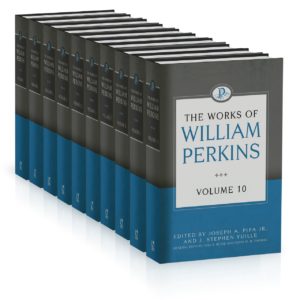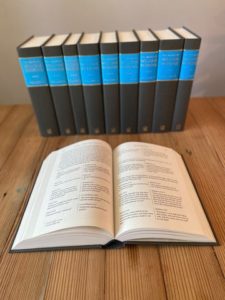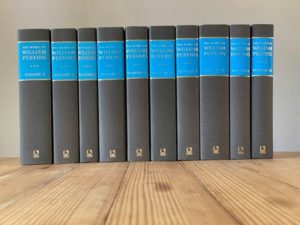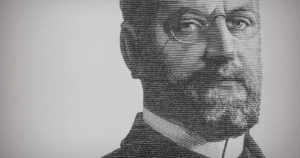
Author’s Corner: The Works of William Perkins
Each week on Credo we welcome you to join us in the Author’s Corner where we will meet a set of authors whose recent books deserve your attention and might even help you grow in your knowledge of theology, history, philosophy, and the scriptures. We hope the Author’s Corner can keep you up-to-date on the most important books published today and where you can find them.
On today’s Author’s Corner we present you with the works of William Perkins from Reformation Heritage.
T he Works of William Perkins fills a major gap in Reformed and Puritan theology. Though Perkins is best known today for his writings on predestination, he also wrote prolifically on many subjects. His works filled over two thousand large pages of small print in three folio volumes and were reprinted several times in the decades after his death. However, his complete works have not been in print since the mid-seventeenth century. This modern typeset edition of the Works includes four volumes of Perkins’s expositions of Scripture, three volumes of his doctrinal and polemical treatises, and three volumes of his practical writings.
he Works of William Perkins fills a major gap in Reformed and Puritan theology. Though Perkins is best known today for his writings on predestination, he also wrote prolifically on many subjects. His works filled over two thousand large pages of small print in three folio volumes and were reprinted several times in the decades after his death. However, his complete works have not been in print since the mid-seventeenth century. This modern typeset edition of the Works includes four volumes of Perkins’s expositions of Scripture, three volumes of his doctrinal and polemical treatises, and three volumes of his practical writings.
Volumes 1-4: Exegetical Works
Volume 1
- Digest or Harmony of the Old and New Testaments
- Combat between Christ and the Devil: Matthew 4:1-11
- Sermon on the Mount
Volume 2
- Commentary on Galatians
Volume 3
- Commentary on Hebrews 11
Volume 4
- Exposition of Jude
- Exposition of Revelation 1-3
Volumes 5-7: Doctrinal and Polemical Treatises
Volume 5
- An Exposition of the Symbol or Apostles’ Creed
- An Exposition of the Lord’s Prayer
- The Foundation of Christian Religion Gathered into Six Principles
Volume 6
- Golden Chain (Foldout poster in the front)
- Manner and Order of Predestination
- Treatise on God’s Free Grace and Man’s Free Will
- Fruitful Dialogue Concerning the End of the World
- Against Alexander Dickson
- On Memory
Volume 7
- A Reformed Catholic
- The Problem of the Forged Catholicism
- A Warning against Idolatry of the Last Times
Volume 8-10: Practical Writings
Volume 8
 A Discourse of Conscience
A Discourse of Conscience- The First Book of the Cases of Conscience
- The Second Book of the Cases of Conscience
- The Third Book of the Cases of Conscience
- A Treatise Tending unto a Declaration whether a Man is in the Estate of Damnation or in the Estate of Grace
- The Whole Treatise of the Cases of Conscience
- A Grain of Mustard Seed
Volume 9
- A Declaration of the True Manner of Knowing Christ Crucified and The True Gain
- A Faithful and Plain Exposition upon Zephaniah 2:1–2
- A Treatise of Man’s Imaginations
- A Direction for the Government of the Tongue According to God’s Word
- A Discourse of the Damned Art of Witchcraft
- A Resolution to the Country Man on Prognostication
Volume 10
- Treatise on How to Live Well in All Estates
- Treatise on Vocations
- Right Manner of Erecting and Ordering a Family
- Calling of the Ministry
- Manner and Method of Preaching
- Christian Equity
- Treatise on Dying Well
About the Author:
W illiam Perkins (1558–1602) earned a bachelor’s degree in 1581 and a master’s degree in 1584 from Christ’s College in Cambridge. During those student years he joined up with Laurence Chaderton, who became his personal tutor and lifelong friend. Perkins and Chaderton met with Richard Greenham, Richard Rogers, and others in a spiritual brotherhood at Cambridge that espoused Puritan convictions.
illiam Perkins (1558–1602) earned a bachelor’s degree in 1581 and a master’s degree in 1584 from Christ’s College in Cambridge. During those student years he joined up with Laurence Chaderton, who became his personal tutor and lifelong friend. Perkins and Chaderton met with Richard Greenham, Richard Rogers, and others in a spiritual brotherhood at Cambridge that espoused Puritan convictions.
From 1584 until his death, Perkins served as lecturer, or preacher, at Great St. Andrew’s Church, Cambridge, a most influential pulpit across the street from Christ’s College. He also served as a teaching fellow at Christ’s College, catechized students at Corpus Christi College on Thursday afternoons, and worked as a spiritual counselor on Sunday afternoons. In these roles Perkins influenced a generation of young students, including Richard Sibbes, John Cotton, John Preston, and William Ames. Thomas Goodwin wrote that when he entered Cambridge, six of his instructors who had sat under Perkins were still passing on his teaching. Ten years after Perkins’s death, Cambridge was still “filled with the discourse of the power of Mr. William Perkins’ ministry,” Goodwin said.
Perkins’s influence as a theologian continued unabated after his death. This was due in large part to the widespread popularity of his writings. His writings were translated into several European languages and greatly influenced British and American Reformed theology, the Dutch Further Reformation, and European Pietism.
About the Editors:
Joseph A. Pipa is president and professor of systematic and homiletical theology at Greenville Presbyterian Theological Seminary.
J. Stephen Yuille is the vice president of academics at Heritage College & Seminary, Cambridge, Ontario. He also serves as associate professor of biblical spirituality at The Southern Baptist Theological Seminary, Louisville, Kentucky.
Joel R. Beeke is president of Puritan Reformed Theological Seminary and a pastor of the Heritage Reformed Congregation in Grand Rapids, Michigan.
Derek W. H. Thomas is senior minister of First Presbyterian in Columbia, South Carolina, and the Robert Strong Professor of Systematic Theology and Practical Theology at Reformed Theological Seminary in Atlanta, Georgia.

